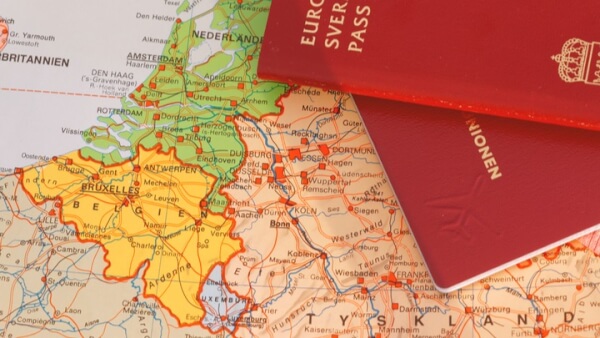Bank and public holidays in Belgium: 2017-2018 guide
Belgium is a melting pot of French, German and Flemish people, and that certainly affects the holidays that are celebrated in the country. Some holidays are...

Brussels is usually seen as the perfect location for expats wanting to explore Europe in their spare time. Sometimes called the “capital of Europe”, Belgium allows its residents and visitors easy access to neighboring countries like Germany, France and the Netherlands. Because of its location, Belgium has three official languages - French, Dutch, and German - and although Brussels is in the primarily Dutch-speaking section of the country, many people also speak French and English.
Brussels’ cost of living is slightly cheaper than most major cities in Europe, except when it comes to food. This is no surprise as Belgium is starting to known more and more as a destination for foodies. Belgian chocolate, beer and waffles are the most commonly known treats, but the proximity to the water means that mussels and shrimp are a must try when visiting the country. For rent itself in a decent sized apartment, however, you’ll only need to budget around €1,000-1,244. It’s also possible to find smaller, older apartments, which can cost as little as €620-850.
Most rentals in Brussels have very long contracts compared to other countries. A short-term lease is anything under three years, and a typical lease is for around nine years, but can go up to 25 years or, in some cases, “for life.” In all cases, you're typically charged a large fee or the full cost of the duration if you break your lease and leave within the first three years. The utilities are paid by the tenant in Brussels, as are additional fees like housing association member fees and community fees for garbage collection.
There are furnished short-term options, similar to apart-hotels, which don’t require the long contract time and usually include utilities and cleaning services. They’re often used as holiday rentals, but many expats enjoy the convenience and ease of using a shorter-term service. If an apartment is listed as unfurnished, it usually comes without basic fittings like curtains or light fixtures as well. When eventually moving out of an unfurnished apartment, you’ll also be asked to return it to the state that it was in when you moved in-- which means, bare.
Most universities in Brussels have dorms or student housing. Students moving to Brussels should work with their university staff to decide the best option for their situation. The average cost of a student dorm is €250 per month. Students can also choose to sublet a room or share a flat with other students without the university’s help. Subletting is legal if the landlord gives the tenants permission, but it’s important to make sure that permission has been given before moving in.
Because Brussels is such a small city with great public transportation and roads for cyclists, there are many suburbs outside the city center that make a great option for expats. If you’d like to live closer to the center though, there are many neighborhoods that are being renovated and could have great deals, like St Géry and Ste Catherine. For a more posh or upscale neighborhood, look in The Sablon and Louise.
If you’re looking for more space and natural beauty, Ixelles has a little bit for everyone. It has affordable areas, but some areas closer to the shops and cafes will be more expensive. A better bet would be to look in Etterbeek, which is known among expats for its townhouses and international schools.
As is the case in most places, if you’re starting your apartment search from abroad the best place to begin is online. These sites are all good jumping off points:
Because residents of Brussels speak a variety of languages and because the city is very popular with expats, most landlords speak English. In case they don’t, or if you're looking for rental advertisements on websites or in person, here are some words in French and Dutch (Brussels’ most spoken languages) to keep in mind:
| English | French | Dutch |
|---|---|---|
| Room | Chambre | Kamer |
| Bedroom | Chambre a Coucher | Slaapkamer |
| Bathroom | Salle de Bain (Bain) | Badkamer |
| Kitchen | Cuisine | Keuken |
| Floor | Etage | Verdieping |
| Heating | Chauffage | Verwarming |
| Furnished | Meublté | Gemeubileerd |
Unfortunately for expats, every region in Belgium has different housing rules and regulations. It’s important to get advice and guidance from a local who is knowledgeable about the rules specific to the area that you're moving to.
Because law in Belgium favors the tenant, most repairs in the apartment will be the tenant’s responsibility. This is usually seen as a positive for tenants who want to paint walls or update appliances - you're able to take much more ownership over your apartment than you would in many other cities.
Also, negotiating with landlords is rare because the Belgian government has regulations for rent that are based on the cost of living index. The government even has a rent estimation tool that can be helpful to see if you're paying too much or too little for your area.
A typical deposit will be between one and three months’ rent. The law requires that your deposit be placed in a special account by the landlord, separate from their personal finances and your rent payments. It’s also recommended that you pay your deposit through a bank transfer - not cash - so there's a record of the transaction.
Most Belgian landlords will accept payment by bank transfer, which can usually be initiated from your account abroad. That being said, international transactions tend to come with somewhat hefty, hidden fees. A service like Transferwise can help ensure you’re getting the real exchange rate, and can cut down on those international fees. It may also be a good idea to set up a local bank account to fund with a bulk of money at once, so you’re not stuck paying transfer fees over and over again.
Agents in Brussels may be helpful to expats looking to move temporarily. If you're looking to move out of your rental in less than three years, working with an agency or a relocation service can put you in contact with owners and landlords who are used to these short-term situations, as finding them on your own can be rather difficult. Most agents will expect to be paid a fee between €250 and one month’s rent.
Beyond Brussels, Belgium has many smaller towns and cities that are each unique in their own way. Depending on the closest neighboring country, you could find a whole new set of traditions and preferred foods.
Deciding to move to Brussels is a great move for any expat interested in exploring a melting pot in the middle of Europe. Bring an open mind (and an empty stomach) and you’ll be enjoying your new Belgian life in no time. Good luck!
*Please see terms of use and product availability for your region or visit Wise fees and pricing for the most up to date pricing and fee information.
This publication is provided for general information purposes and does not constitute legal, tax or other professional advice from Wise Payments Limited or its subsidiaries and its affiliates, and it is not intended as a substitute for obtaining advice from a financial advisor or any other professional.
We make no representations, warranties or guarantees, whether expressed or implied, that the content in the publication is accurate, complete or up to date.

Belgium is a melting pot of French, German and Flemish people, and that certainly affects the holidays that are celebrated in the country. Some holidays are...

Brussels is the de facto capital of Europe, and with many European institutions and global businesses based there, it’s become a hub of expat activity. A...

Belgium is one of Europe’s foremost financial and political centres, drawing in expats from all over the world to work in Brussels and beyond. With large...